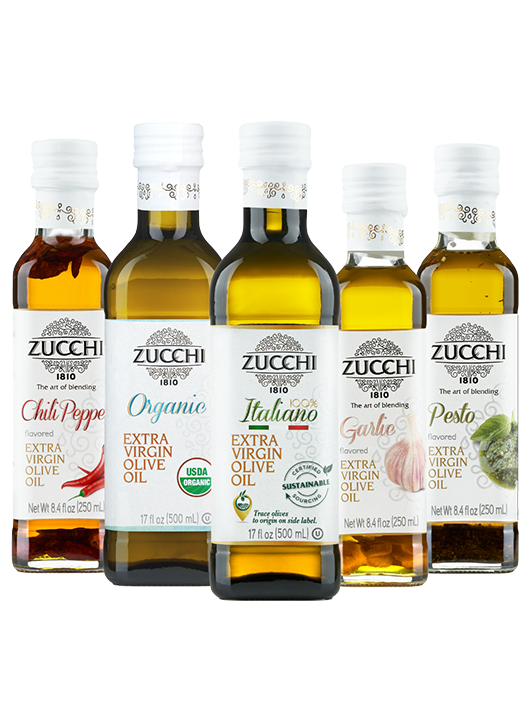How to Master the Art of Baking with Olive Oil
No butter? No problem! Discover the benefits of baking with olive oil and learn how to use it in your next baking project.
May 5, 2021

No butter? No problem! Discover the benefits of baking with olive oil and learn how to use it in your next baking project.
May 5, 2021
There’s no doubt about it: baking with olive oil is a skill that every home chef should know. Whether you’ve just run out of butter while baking a cake or you’re looking to opt for a healthier, plant-based substitute in your banana muffins, extra virgin olive oil is wonderful fat to bake with.
While butter has its time and place (hello shortbreads!), there are many advantages to baking with olive oil.
For one, olive oil is considered a “healthy fat.” Unlike butter which is high in saturated fat, olive oil contains primarily unsaturated fat– specifically monounsaturated fat. These monounsaturated fats can help with weight loss and may reduce your risk of developing heart disease.
Furthermore, extra virgin olive oil contains powerful antioxidants called polyphenols, which can help our bodies fight off cancer, reduce heart disease, and ease inflammation. How’s that for enjoying a sweet treat?
It’s important to note that high-quality extra virgin olive oils tend to contain more of these healthy fats and nutrients than lower quality olive oils. If you’re looking for a healthy boost, stick to the best EVOO you can find!
Another benefit to baking with olive oil? It adds a more nuanced, fruity flavor and moister texture to your baked treats that you can’t always achieve with butter or vegetable oils.
You can easily substitute butter with olive oil in most recipes. We recommend following a 3:4 ratio: replace every 4 parts butter with 3 parts olive oil. Another way of converting a recipe is to use 3 tablespoons of olive oil for every ¼ cup of butter.
Here’s a handy butter to olive oil conversion chart:
Note that there are some instances where you shouldn’t replace butter with olive oil. For example, when a recipe calls for creaming butter together with sugar, don’t substitute in olive oil since it won’t produce the same creaming effect as butter. Another example is when a recipe calls for butter or shortening in a solid form, such as icing. Finally, never bake with olive oil above 375°F. This is because olive oil’s smoke point is somewhere around 375-405°F, so baking with it above that temperature may result in burnt edges and a smoky oven!
Yes, you can absolutely replace vegetable oil with olive oil when baking. Simply follow a 1:1 ratio. For example, if a recipe calls for 1 cup of vegetable oil, you can substitute it with 1 cup of olive oil.
One of the major benefits of replacing vegetable oil with a good quality extra virgin olive oil is that the olive oil will add a fruity, more intense flavor giving your finished cake or bread a delicious depth of flavor.
When it comes to baking with olive oil we liken it to cooking with wine. Most chefs agree that you should never cook with a wine that you wouldn’t drink. We say: never bake with olive oil that you wouldn’t drizzle on a finished dish!
That being said, there are some flavors and intensities that tend to be more suitable for baking. We suggest sticking with high-quality extra virgin olive oils that have a mild intensity and delicate, fruity flavor. Avoid extra virgin olive oils that have a strong intensity and peppery notes which might overpower other flavors in your cakes, breads, and cookies. For example, our Organic Extra Virgin Olive Oil is our preferred olive oil to bake with because it has a light and delicate intensity with notes of ripe fruit.
Make sure that your extra virgin olive oil is stored properly for the best results. Remember: olive oil is a fruit juice! If your bottle of olive oil is exposed to too much heat, light, and air, or is kept past its “best by” date, it can become rancid, giving your baked good a bitter, unpleasant taste.
While you can use olive oil in just about any baking project, we find that it works particularly well in sweet cakes, muffins, cookies, and loaves that have a fruity or nutty flavor, like this Orange Olive Oil Cake or these Chocolate-Covered Orange Pistachio Cookies. Another one of our favorite pairings is with dark chocolate treats. The bitterness and fruitiness of the dark chocolate are complemented beautifully by the bitter, fruity notes of extra virgin olive oil. Try it for yourself with our Flourless Chocolate Olive Oil Cake!
Savory baked goods are an obvious choice for olive oil baking as well. You can easily incorporate olive oil into your breads, breadsticks, crackers, and even savory muffins.
Ready to start baking with olive oil? Explore our olive oil recipes for creative ways to drizzle, sizzle, and everything in between.

Ready to bring sustainable Italian culinary tradition into your kitchen? Shop Zucchi in a store near you.
Get olive oil recipes, tips, and Zucchi promotions delivered straight to your inbox.
